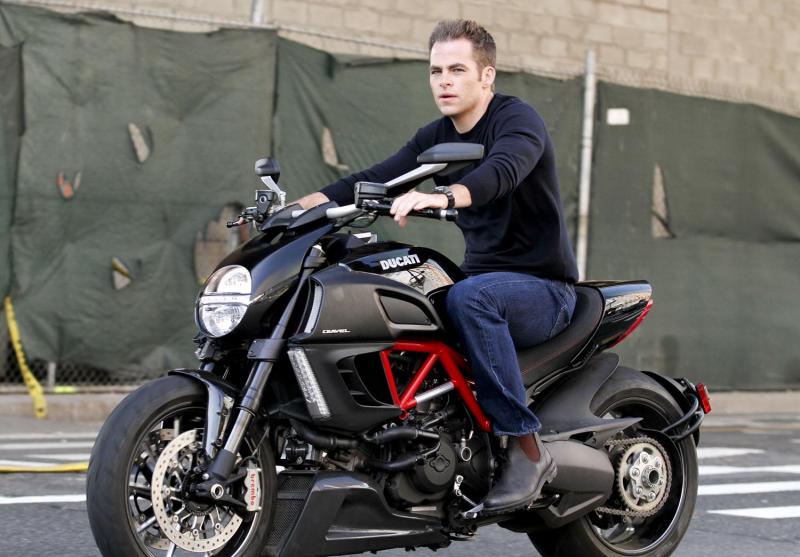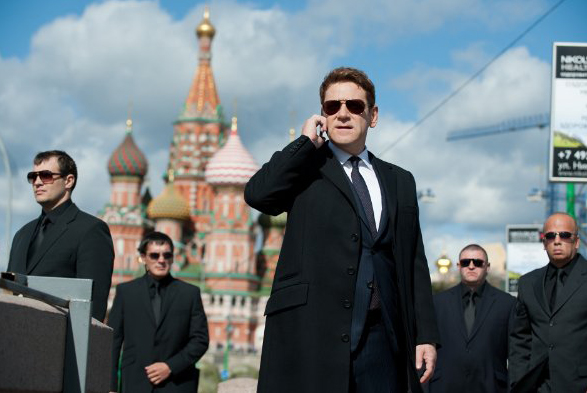Jack Ryan: Shadow Recruit | reviews, news & interviews
Jack Ryan: Shadow Recruit
Jack Ryan: Shadow Recruit
Tom Clancy's gung-ho CIA operative bounces back in his fourth incarnation

Assuming you care at all, your favourite incarnation of Tom Clancy's industrious CIA agent Jack Ryan is probably Harrison Ford (Patriot Games, Clear and Present Danger). Before him came Alec Baldwin in The Hunt for Red October, and afterwards there was Ben Affleck in The Sum of All Fears.
But Affleck's Ryan was a dozen years ago, enough of a gap to give fresh-faced new boy Chris Pine (who has also rebooted Star Trek's Captain James T Kirk) some space to put his personal stamp on the role. This new episode is a kind of Ryan prequel, a story created by screenwriters Adam Cozad and David Koepp but using echoes of Clancy's characters and their po-faced government-spook milieu. For instance, Clancy's Ryan was a trained economist, but didn't study at the London School of Economics as Pine's character does. Clancy's Ryan survived a helicopter crash in the Mediterranean, but Pine's Ryan faces a fiery chopper-armagedddon in Afghanistan, where he's serving as a Marine.
 The writers, in cahoots with director Kenneth Branagh, have dutifully served up a true-blue flag-salutin' Ryan, who watches the 9/11 catastrophe on TV while he's a student in London and rushes back home to serve his country. Hence the torrid Afghan air crash and Ryan's subsequent relationship with his therapist in a military hospital, Cathy Muller (a frisky Keira Knightley, pictured right). It's while he's stoically battling to regain the full use of his limbs that he finds himself being observed by a broody-looking older guy in a Navy uniform, who bears a mysterious resemblance to Kevin Costner. His name's Harper, he works for the CIA, and his antennae tell him that young Ryan has the right Agency stuff. Pine's mix of doe-eyed idealism and steely toughness serves the role pretty well.
The writers, in cahoots with director Kenneth Branagh, have dutifully served up a true-blue flag-salutin' Ryan, who watches the 9/11 catastrophe on TV while he's a student in London and rushes back home to serve his country. Hence the torrid Afghan air crash and Ryan's subsequent relationship with his therapist in a military hospital, Cathy Muller (a frisky Keira Knightley, pictured right). It's while he's stoically battling to regain the full use of his limbs that he finds himself being observed by a broody-looking older guy in a Navy uniform, who bears a mysterious resemblance to Kevin Costner. His name's Harper, he works for the CIA, and his antennae tell him that young Ryan has the right Agency stuff. Pine's mix of doe-eyed idealism and steely toughness serves the role pretty well.
To exploit Ryan's knowledge of economics, Harper packs him off to earn a Government-sponsored PhD and then installs him in a Wall Street bank, where he's tasked with monitoring suspicious financial activity. And guess what - he unearths a bunch of dubious-looking accounts, and with uncanny speed deduces that the Russians have devised a fiendish plot to crash the US economy.
Next stop Moscow, where Ryan meets the intimidating Viktor Cherevin. He's played with cold-eyed, compressed-lipped deadliness by Branagh himself, whose directorial alter ego has let him get away with a Russian accent perhaps left over from an old episode of Callan. Still, the idea that the Russians are back as America's number one enemy has a touch of old-world spy movie charm about it, and Branagh's treatment of his material throughout harks back to the days when characters used to punch or shoot each other rather than relying on a CGI holocaust occurring every 15 minutes (Branagh as Cherevin, below).
 For instance, Ryan must survive a frenzied surprise attack by his supposed driver, played with rumbling enormousness by Nonso Anozie (alias Renfield from Sky Living's tuned-up Dracula), which involves the shattering of every object in his hotel room, including sinks and toilet bowls. Then there's much Mission: Impossible-style breaking and entering to be done before it all blows up in Manhattan.
For instance, Ryan must survive a frenzied surprise attack by his supposed driver, played with rumbling enormousness by Nonso Anozie (alias Renfield from Sky Living's tuned-up Dracula), which involves the shattering of every object in his hotel room, including sinks and toilet bowls. Then there's much Mission: Impossible-style breaking and entering to be done before it all blows up in Manhattan.
It's a movie that keeps you engaged for its economical 105 minutes without ever threatening to challenge the best of Bond or Bourne. It's not quite smart or twisty enough, and the endgame trundles yawn-evokingly to a not-very-surprising conclusion. Still, with better scripts and a bit more mileage, Chris Pine might find he has another potboiling franchise to keep him in gainful employment.
rating
Share this article
The future of Arts Journalism
You can stop theartsdesk.com closing!
We urgently need financing to survive. Our fundraising drive has thus far raised £49,000 but we need to reach £100,000 or we will be forced to close. Please contribute here: https://gofund.me/c3f6033d
And if you can forward this information to anyone who might assist, we’d be grateful.

Subscribe to theartsdesk.com
Thank you for continuing to read our work on theartsdesk.com. For unlimited access to every article in its entirety, including our archive of more than 15,000 pieces, we're asking for £5 per month or £40 per year. We feel it's a very good deal, and hope you do too.
To take a subscription now simply click here.
And if you're looking for that extra gift for a friend or family member, why not treat them to a theartsdesk.com gift subscription?
more Film
 Bugonia review - Yorgos Lanthimos on aliens, bees and conspiracy theories
Emma Stone and Jesse Plemons excel in a marvellously deranged black comedy
Bugonia review - Yorgos Lanthimos on aliens, bees and conspiracy theories
Emma Stone and Jesse Plemons excel in a marvellously deranged black comedy
 theartsdesk Q&A: director Kelly Reichardt on 'The Mastermind' and reliving the 1970s
The independent filmmaker discusses her intimate heist movie
theartsdesk Q&A: director Kelly Reichardt on 'The Mastermind' and reliving the 1970s
The independent filmmaker discusses her intimate heist movie
 Blu-ray: Wendy and Lucy
Down-and-out in rural Oregon: Kelly Reichardt's third feature packs a huge punch
Blu-ray: Wendy and Lucy
Down-and-out in rural Oregon: Kelly Reichardt's third feature packs a huge punch
 The Mastermind review - another slim but nourishing slice of Americana from Kelly Reichardt
Josh O'Connor is perfect casting as a cocky middle-class American adrift in the 1970s
The Mastermind review - another slim but nourishing slice of Americana from Kelly Reichardt
Josh O'Connor is perfect casting as a cocky middle-class American adrift in the 1970s
 Springsteen: Deliver Me From Nowhere review - the story of the Boss who isn't boss of his own head
A brooding trip on the Bruce Springsteen highway of hard knocks
Springsteen: Deliver Me From Nowhere review - the story of the Boss who isn't boss of his own head
A brooding trip on the Bruce Springsteen highway of hard knocks
 The Perfect Neighbor, Netflix review - Florida found-footage documentary is a harrowing watch
Sundance winner chronicles a death that should have been prevented
The Perfect Neighbor, Netflix review - Florida found-footage documentary is a harrowing watch
Sundance winner chronicles a death that should have been prevented
 Blu-ray: Le Quai des Brumes
Love twinkles in the gloom of Marcel Carné’s fogbound French poetic realist classic
Blu-ray: Le Quai des Brumes
Love twinkles in the gloom of Marcel Carné’s fogbound French poetic realist classic
 Frankenstein review - the Prometheus of the charnel house
Guillermo del Toro is fitfully inspired, but often lost in long-held ambitions
Frankenstein review - the Prometheus of the charnel house
Guillermo del Toro is fitfully inspired, but often lost in long-held ambitions
 London Film Festival 2025 - a Korean masterclass in black comedy and a Camus classic effectively realised
New films from Park Chan-wook, Gianfranco Rosi, François Ozon, Ildikó Enyedi and more
London Film Festival 2025 - a Korean masterclass in black comedy and a Camus classic effectively realised
New films from Park Chan-wook, Gianfranco Rosi, François Ozon, Ildikó Enyedi and more
 After the Hunt review - muddled #MeToo provocation
Julia Roberts excels despite misfiring drama
After the Hunt review - muddled #MeToo provocation
Julia Roberts excels despite misfiring drama
 London Film Festival 2025 - Bradley Cooper channels John Bishop, the Boss goes to Nebraska, and a French pandemic
... not to mention Kristen Stewart's directing debut and a punchy prison drama
London Film Festival 2025 - Bradley Cooper channels John Bishop, the Boss goes to Nebraska, and a French pandemic
... not to mention Kristen Stewart's directing debut and a punchy prison drama
 Ballad of a Small Player review - Colin Farrell's all in as a gambler down on his luck
Conclave director Edward Berger swaps the Vatican for Asia's sin city
Ballad of a Small Player review - Colin Farrell's all in as a gambler down on his luck
Conclave director Edward Berger swaps the Vatican for Asia's sin city

Add comment